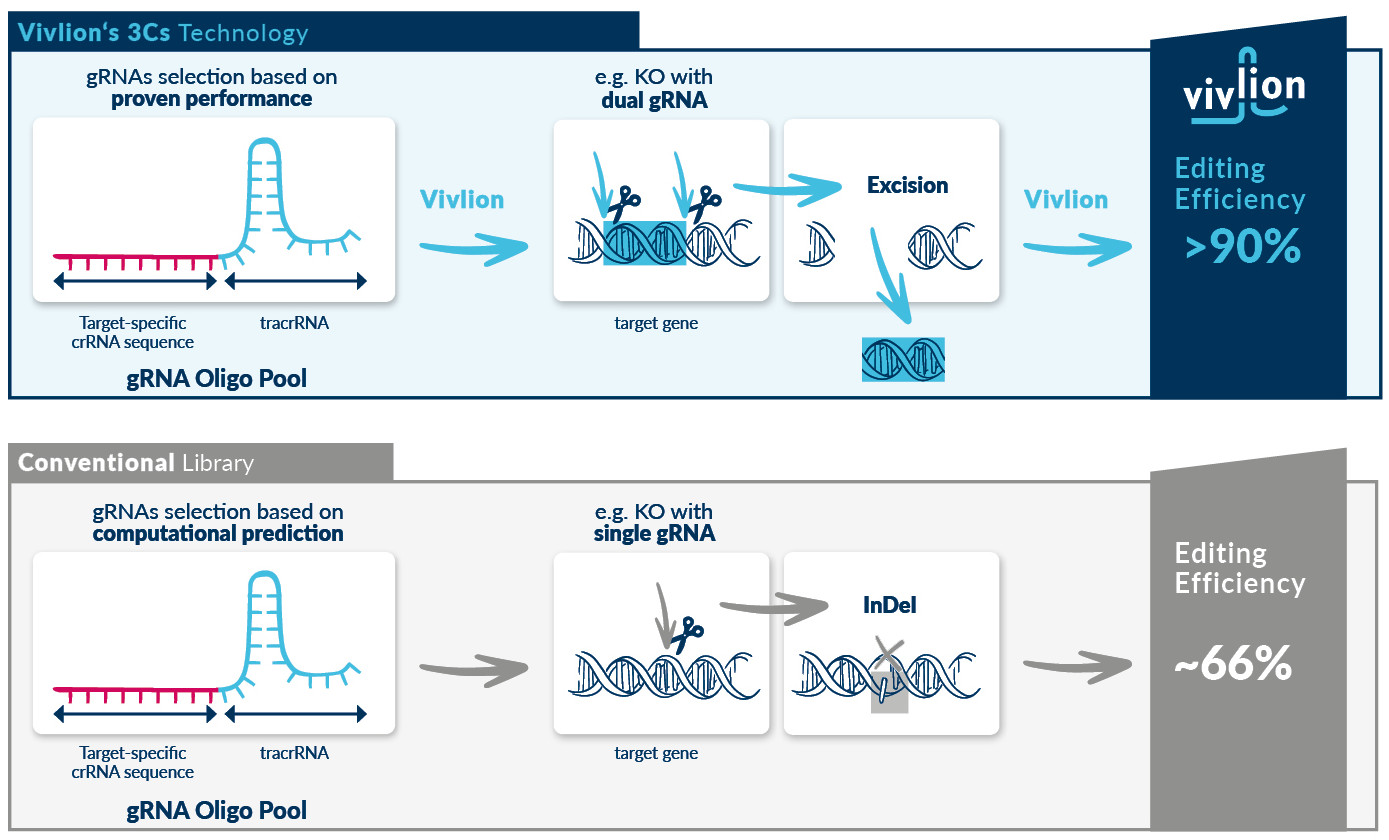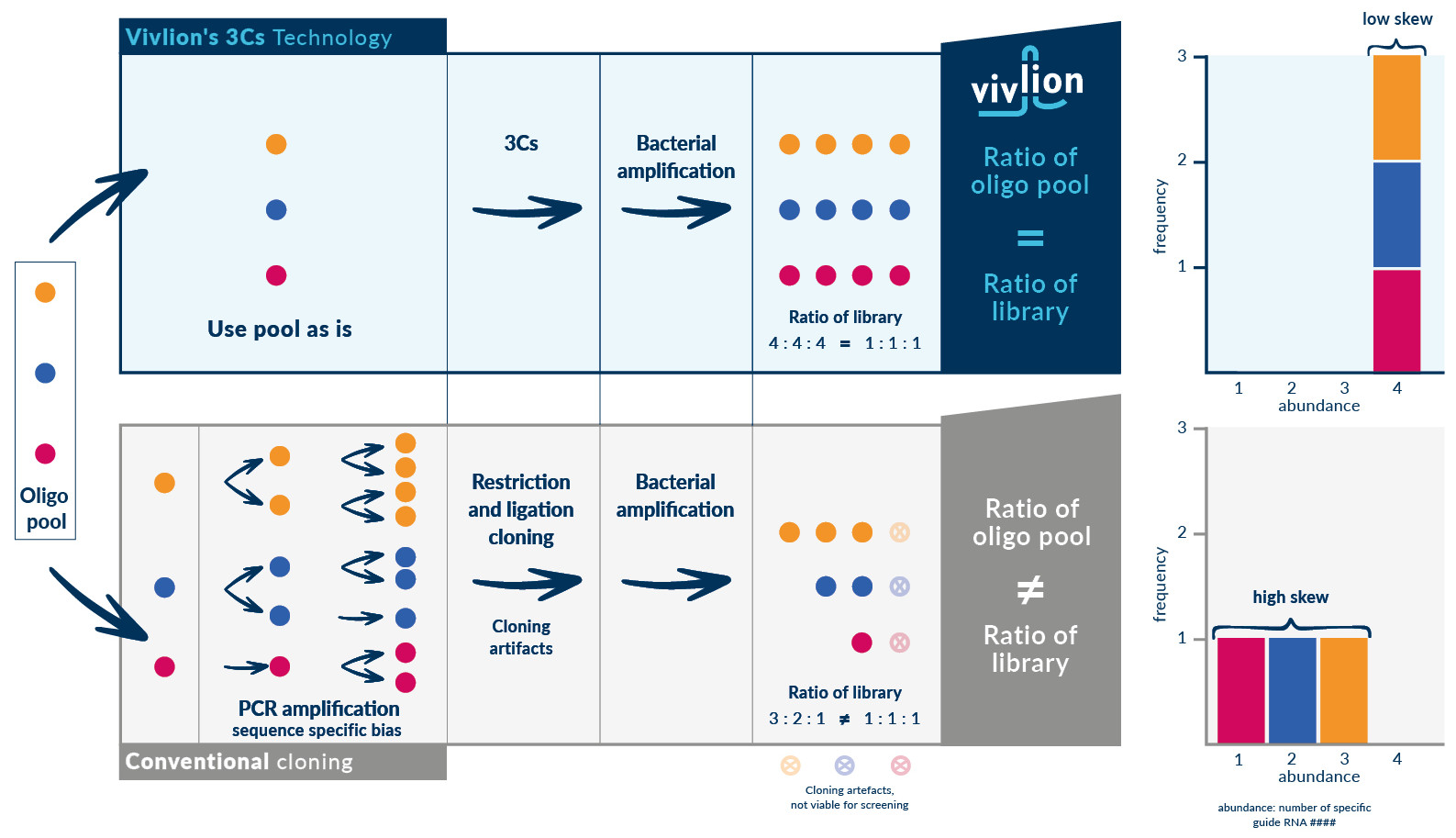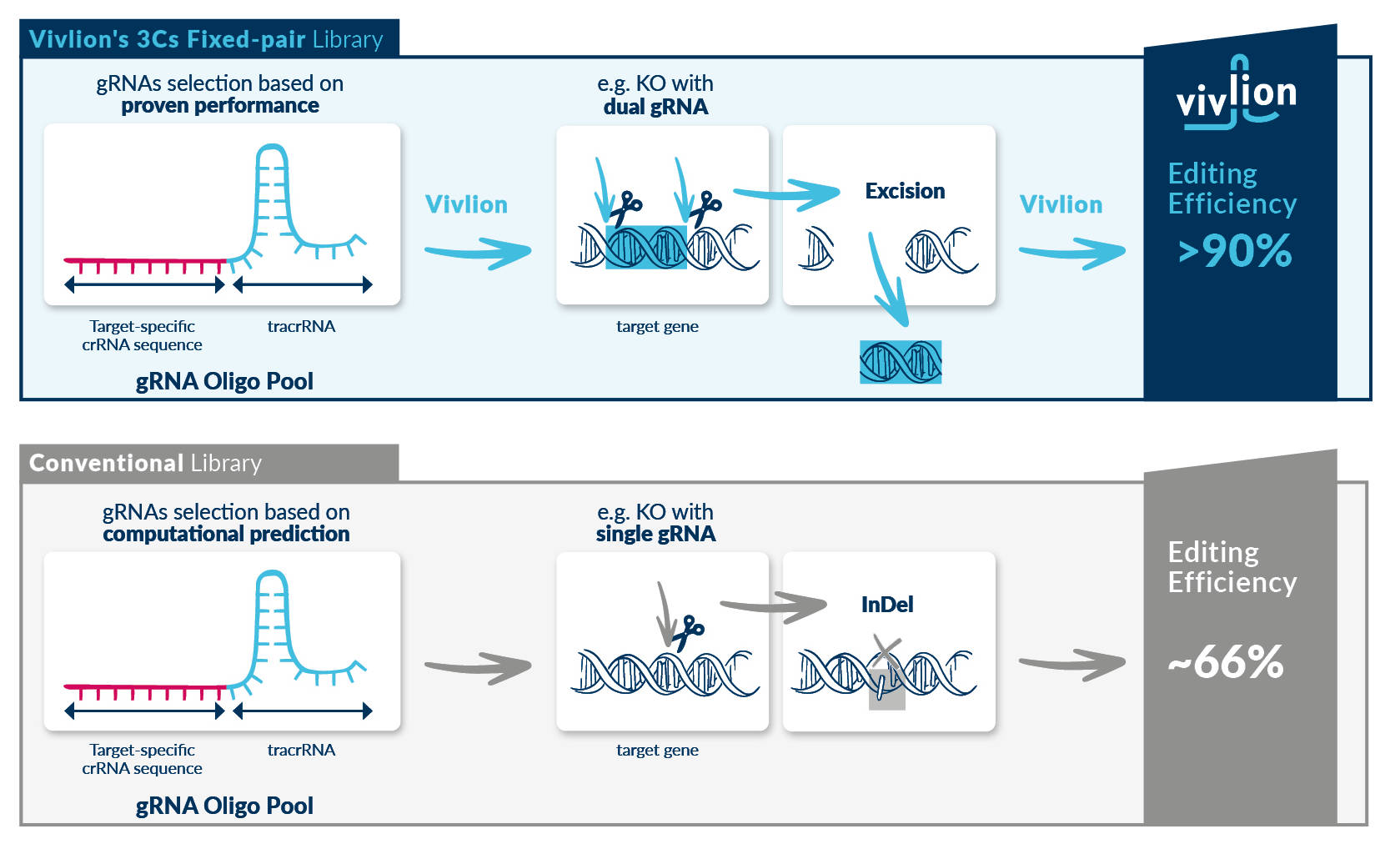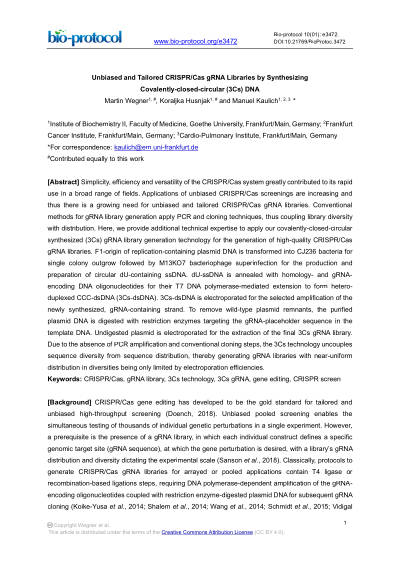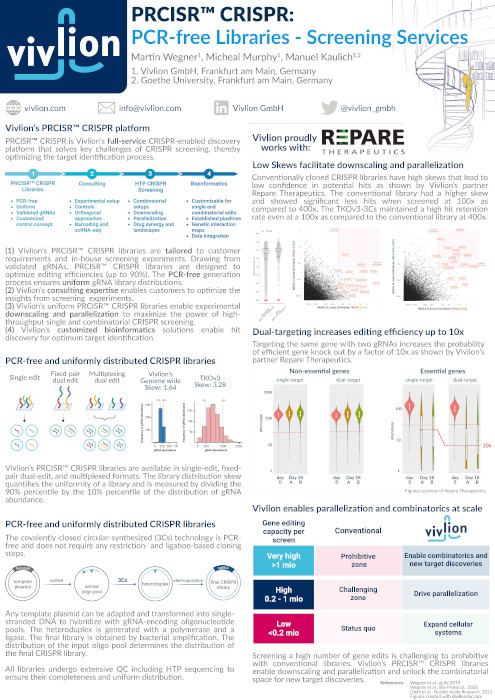Vivlion’s Technology
PRCISRTM CRISPR gRNA libraries empower next-generation CRISPR screens
Technology
Uniformity & skew
Resources
Contact us
Our technology in more detail
PRCISR™ CRISPR libraries are produced using Vivlion’s proprietary Covalently-Closed-Circular-synthesized (3Cs) technology, enabling PCR-free and cloning-free generation of high-quality CRISPR/Cas gRNA libraries.
gRNA-encoding oligonucleotides are annealed to circular, deoxyuridine (dU)-containing single-stranded PRCISR™ CRISPR template plasmids, followed by their polymerase-mediated extension to form heteroduplexed double-stranded PRCISR™ CRISPR plasmids. Library diversity is defined solely by the number of gRNA-encoding oligonucleotides. PRCISR™ CRISPR libraries are amplified in bacteria, removing the template plasmids and yielding the final PRCISR™ CRISPR gRNA library.
The PRCISR™ CRISPR process that leads to uniform libraries of low skew is summarized in the following graph. This is contrasted with conventional library preparation that has the challenges of PCR amplification bias and template switching issues, in addition to restriction and ligation artefacts, leading to ununiform libraries with high distribution skews.
Uniformity enables diversity. Due to the PCR-free library production process, PRCISR™ CRISPR libraries are uniformly distributed, thereby ensuring gRNA distribution is no longer impacted by library size.
More simplicity by reducing experimental size. PRCISR™ CRISPR libraries can be applied with significantly lower coverage, reducing experimental size (10x) and cell culture work.
Experiments at scale. PRCISR™ CRISPR libraries enable experimental parallelization, the use of sparse cell material and in vivo applications.
Stringent quality control. PRCISR™ CRISPR libraries are subject to strict quality control (QC) through next-generation sequencing (NGS). QC reports and NGS read-counts are provided with the library.
PRCISR™ CRISPR plasmids are offered in 3 possible gRNA arrangements: single, fixed-pair and dual-multiplex. All plasmids are available as all-in-one systems containing the nuclease and, in addition, are customizable according to choice of promoter, tracrRNA, antibiotic selection marker, fluorescence, barcode and scRNA-seq capture sequence.
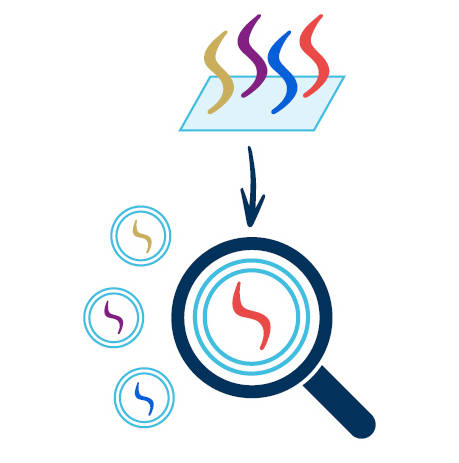
Single
1 gRNA per plasmid
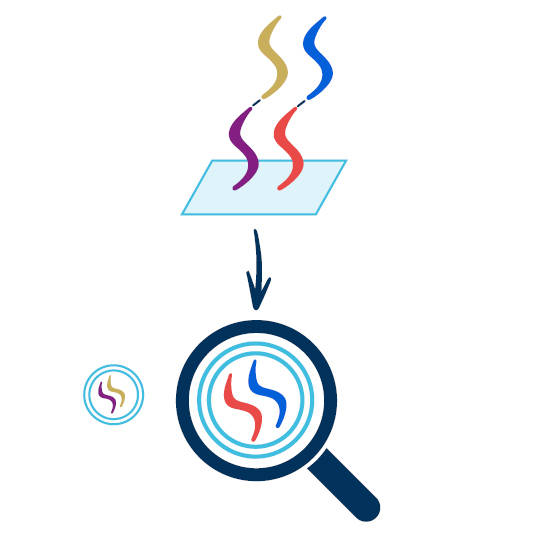
Fixed-pair
Pre-defined pairs of gRNA per plasmid
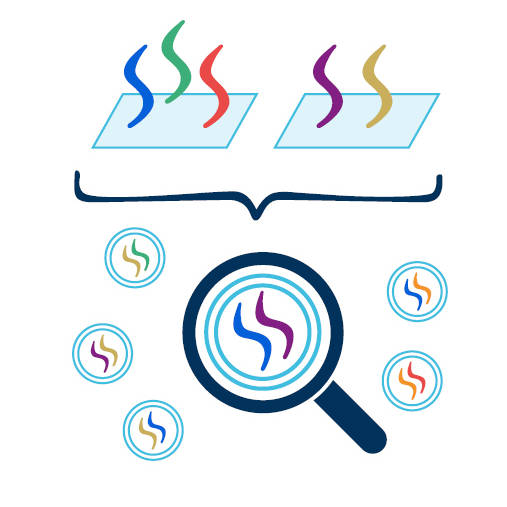
Dual-multiplex
Pairs of gRNAs per plasmid according to set combinations (all-by-all, few-by-all, all-by-few, few-by-few)
Uniformity & skew
The generation of all CRISPR gRNA libraries starts with the choice of oligonucleotide pool that encodes the respective gRNA sequences.
Conventional cloning requires the PCR amplification of the oligonucleotide pool. During each cycle of the PCR amplification process, the polymerase amplifies certain gRNA sequences more than others which leads to under-represented and over-represented sequences (“sequence specific bias”) [REF]. In addition, the polymerase has a specific error rate which causes mutations in the amplified PCR product. Both of these issues are ultimately reflected in the final library’s gRNA sequences. After PCR amplification, the oligo pool is then incorporated into the plasmid using restriction and ligation cloning. This step is inefficient due to inefficient vector ligation and vector religation issues (“cloning artifacts”). Finally, the cloned library is amplified in bacteria to obtain the desired amounts of plasmid DNA – however, the uniformity of the library is impacted by sequence specific bias and cloning artifacts which lead to high skew.
In contrast, Vivlion’s 3Cs technology avoids these issues. 3Cs directly utilizes the oligo pool “as-is” (avoiding sequence specific PCR bias). In addition, the technology does not use restriction and ligation based cloning (avoiding cloning artifacts). The library is amplified in bacteria using highly efficient protocols to obtain the final highly uniform PRCISR™ CRISPR library with low skew (reflecting the distribution of the original oligo pool).
How often do we see gRNAs occurring in the final library? A histogram shows how often gRNA sequences occur in the final library. The x-axis shows gRNA abundance and the y-axis shows the number of gRNAs with a specific abundance. Ideally, all gRNA sequences are equally abundant.
Editing efficiency
The gRNAs selected for many conventional CRISPR libraries are typically based on computational predictions of their activity. The highest scoring gRNAs are assembled into a library that delivers a single gRNA to a cell, resulting in a single gene editing event. For knockout-experiments, the introduction of a single insertion or deletion (InDel) leads to gene editing efficiencies of approximately 66%.
However, the gRNAs selected for Vivlion’s fixed-pair libraries are based on published data of hundreds of CRISPR screens. From this data, gRNAs are selected and assembled into a library of pre-defined pairs, delivering two highly functional gRNAs to each cell, each targeting a gene of interest. The gRNA pairs are designed to excise and remove a part of the target gene, thereby improving gene editing efficiencies to more than 90%.
Very excited to continue our productive relationship with Vivlion GmbH. It has been a great experience working with their talented team and excellent gene editing reagents!
Resources
Publications
Application range of 3Cs technology expanded to orthogonal screens
Cetin R, Wegner M, Luwisch L, Saud S, Achmedov T, Süsser S, Vera-Guapi A, Müller K, Matthess Y, Quandt E, Schaubeck S, Beisel CL, Kaulich M. Optimized metrics for orthogonal combinatorial CRISPR screens. Sci Rep. 2023 13(1):7405.
ReCo: a stand-alone and user-friendly analytics tool for analysis of PRCISR CRISPR screens
3Cs multiplexing in action: a scalable method for combinatorial CRISPR screening
Minimized combinatorial CRISPR screens identify genetic interactions in autophagy. Nucleic Acids Res 2021, 49(10): 5684-5704.
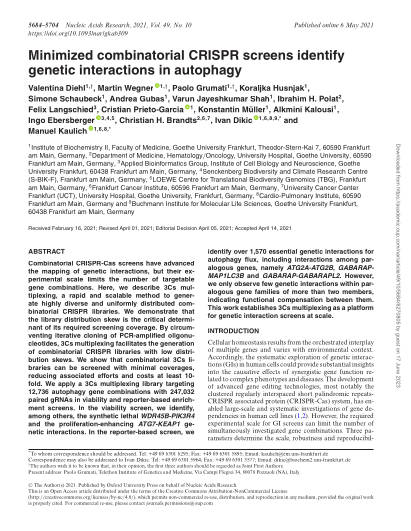
Take a deep tech dive into 3Cs PRCISR CRISPR gRNA library generation.
Wegner M, Husnjak K, Kaulich M. Unbiased and Tailored CRISPR/Cas gRNA Libraries by Synthesizing Covalently-closed-circular (3Cs) DNA. Bio Protoc 2020, 10(1): e3472.
First publication of 3Cs PRCISR CRISPR technology – demonstrating fidelity and performance of 3Cs reagents.
Wegner M, Circular synthesized CRISPR/Cas gRNAs for functional interrogations in the coding and noncoding genome. Elife 2019, 8: e42549.
GIT Laborportal features 3Cs technology
Koch & Kaulich, GIT Laborfachzeitschrift 1-2/2020
Presentations at conferences and online series
CRISPR Medicine News Webinar, 6th December 2023.
PRCSR CRISPR: Vivlion’s CRISPR-enabled Discovery Platform | CRISPR-based Genetic Screens Enable the Discovery of Oncology Drug Targets, Predictive Biomarkers, and Mechanisms of Resistance.
Front Line Genomics Webinar, 30th November 2023.
Gene Editing From Research to Practice: Webinar 1 – The Expansion of The Gene Editing Toolbox.
CRISPR Conference 2023 in Würzburg, Germany.
Poster by Wegner M & Murphy M. PRCISR™ CRISPR: Vivlion’s CRISPR-enabled discovery platform. CRISPR Conference Würzburg. 27th June – 1st July 2023.
Discovery Europe in Berlin, Germany.
Poster by Wegner M & Murphy M. PRCISR™ CRISPR: Vivlion’s CRISPR-enabled discovery platform. Discovery Europe. 6-7th June 2023.
International SciLifeLab CRISPR symposium at the Karolinska Institute in Stockholm, Sweden.
Poster by Wegner M & Murphy M. PRCISR™ CRISPR: Vivlion’s CRISPR-enabled discovery platform. International symposium “CRISPR as a research tool in cancer and regenerative medicine”. 25-26th May 2023.
NextGen Omics in Boston, USA.
Presentation and poster by Wegner M. PRCISR™ CRISPR: Vivlion’s CRISPR-enabled discovery platform. NextGen Omics Boston. 30th Mar 2023.
CRISPR in Drug Discover meeting in Oxford, UK.
Poster by Wegner M & Junker F. Synthetic lethality and genetic interaction mapping at scale. CRISPR in Drug Discovery. 7-8th Feb 2023.
ELRIG Drug Discovery in London, UK.
Poster by Wegner M & Junker F. Optimized CRISPR-Cas screening a scale with Vivlion. ELRIG Drug Discovery. 4-5th Oct 2022.
Contact us
We would like to hear more about your CRISPR questions and applications – please reach out to us by completing the following form:

